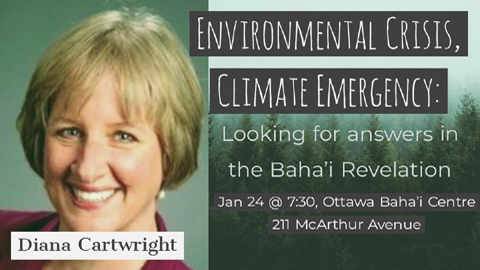 |
 |
|
February 14, 2020 THE CLIMATE CRISIS AND THE BAHÁ’Í VISION by Jay Howden An encouraging audience of 35 gathered at the Ottawa Bahá’í Centre at 211 MacArthur Avenue for the first evening of the “Big Ideas” series. Diana Cartwright, a federal civil servant, has dedicated her professional life to understanding and action on environmental subjects. Her wide experience, from local activism to international congresses, made her an ideal presenter, on January 24, of “Environmental Crisis, Climate Emergency: Looking for Answers in the Bahá’í Revelation”.  “As Naomi Klein wrote,” Cartwright said, “the climate crisis changes everything.” It invites extremes: while many ignore or even deny climate change, others despair that we’ve already failed. Yet despite grim assessments by scientists worldwide and the fires and floods deranging whole societies, there is hope, she insisted. Bahá’u’lláh made it clear that humanity is not just theoretically a single thing, but that its unity and peace are inevitable stages in its evolution. “The tabernacle of unity hath been raised; regard ye not one another as strangers, He announced. “Ye are the fruits of one tree, and the leaves of one branch.” Ms. Cartwright emphasized three concepts. First, she argued, “Climate change is acting as a catalyst to world unity.” As dire and global as the effects of warming are – extreme weather catastrophes, the quieter threats of rising and warming seas – they also prove that national borders are illusory, and narrow self-interest counterproductive. Unprecedented, mounting levels of atmospheric carbon are a global emergency, and there is no hiding from the need to address them globally, together. We must unite and, as Cartwright pointed out, we are – though she wishes we moved a little faster! |
|
|